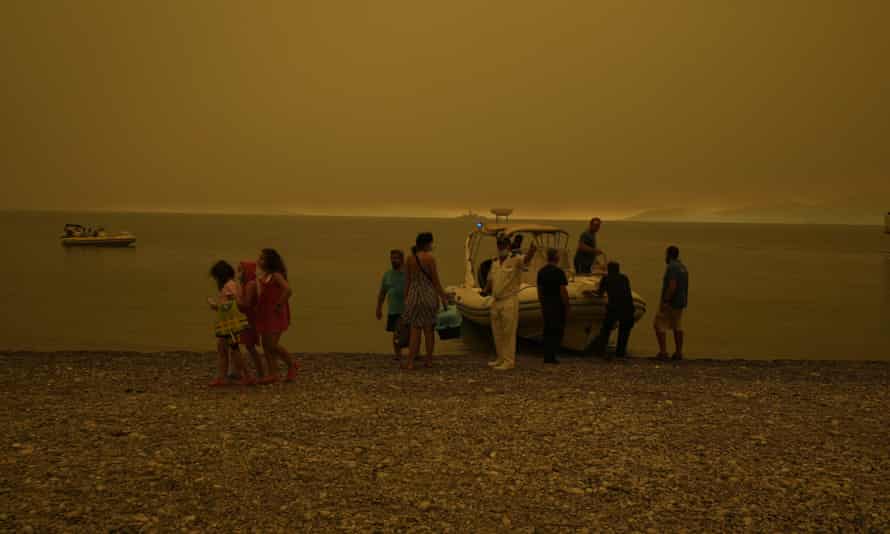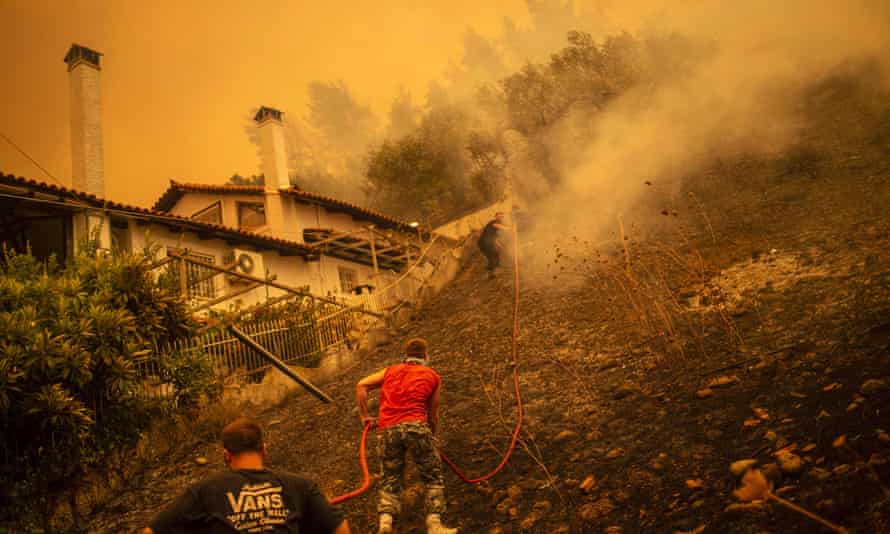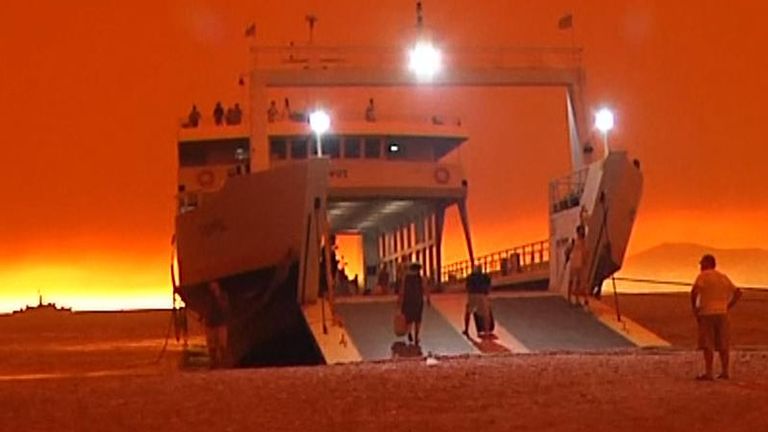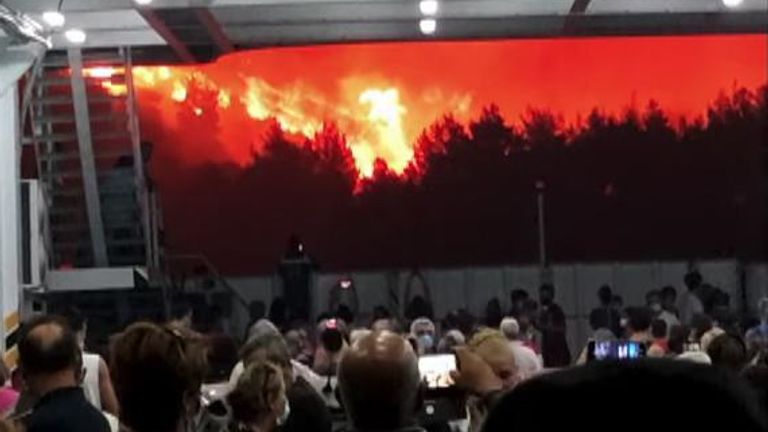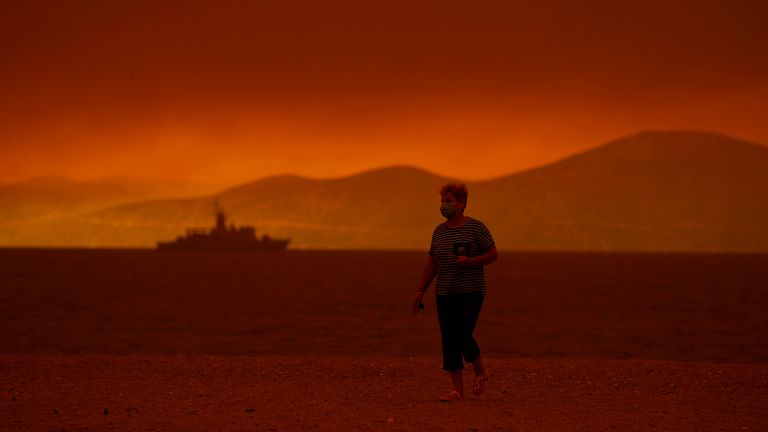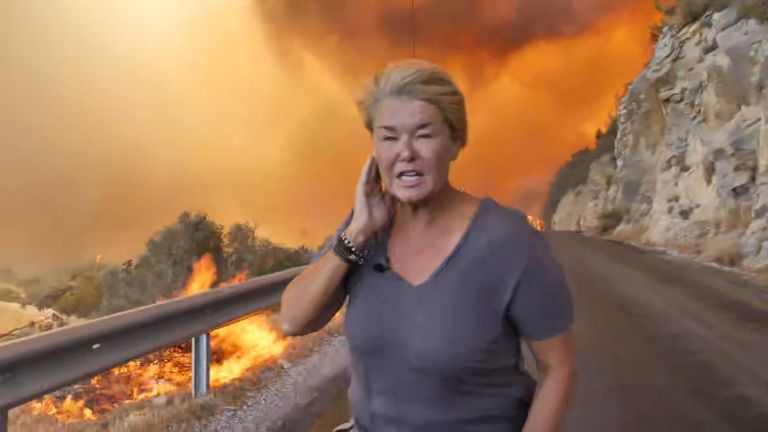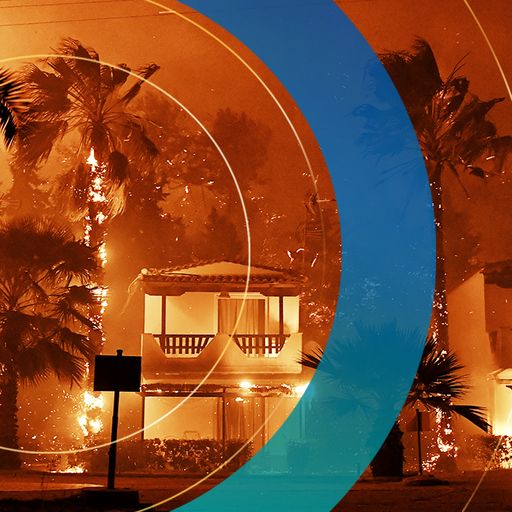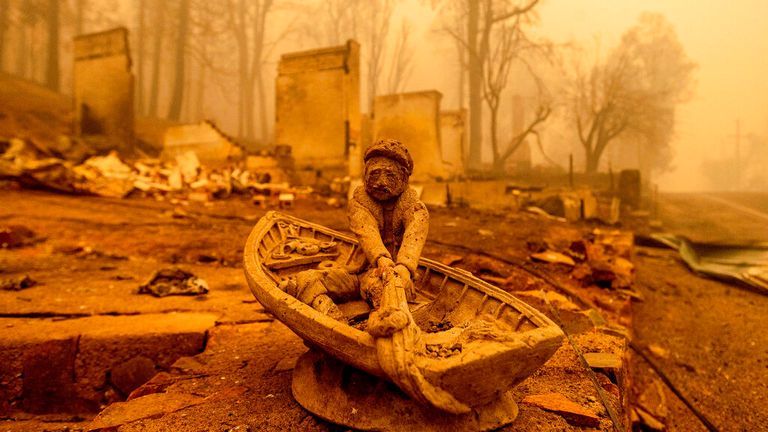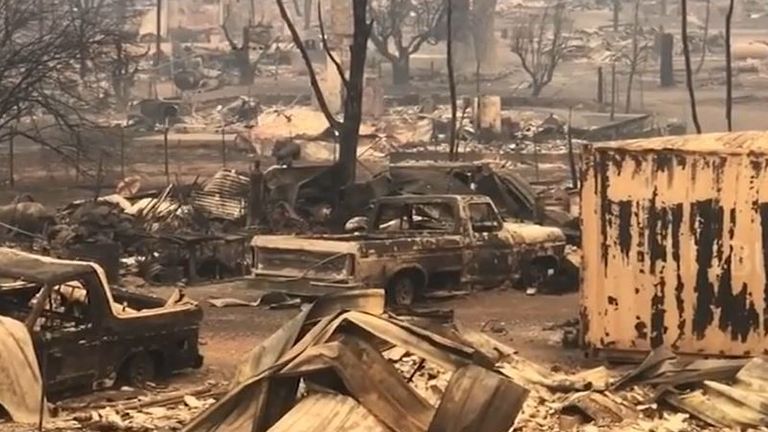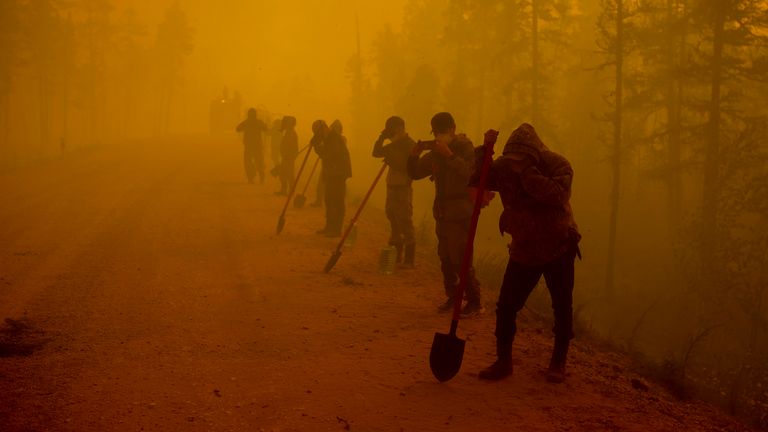Issued on: 09/08/2021 -

Reedley (United States) (AFP)
In the valleys of central California, the search for water has turned into an all-out obsession as the region suffers through a drought that could threaten the US food supply.
Residents have watched with dismay as verdant fields have turned into brown, dusty plains, leaving shriveled trees, dying plants and exasperated farmers.
Much of California, and of the broader US West, has suffered through years of lighter-than-usual precipitation and a particularly dry winter.
State and local authorities, fearful that there may not be enough water for city dwellers or wildlife, have abruptly cut supplies to farms, provoking anger and consternation.
Along the roads between major farming operations, billboards have popped up everywhere, urging: "Save California's Water." They accuse the authorities of "dumping... our water in the ocean."

Growers complain that the state's Democratic governor, Gavin Newsom, is strangling them under a mountain of pointless restrictions, leaving them unable to fill their usual role of supplying America's supermarkets.
- 'Starving' the world -
"I had two wells dry up last week," 28-year-old Nick Foglio, a fourth-generation farmer and feed broker, told AFP. He added that he has "2,000 acres (800 hectares) of alfalfa going dry."
 A bird eats the seeds of a dried flower on the farm of Liset Garcia, in Reedley, California Robyn Beck AFP/File
A bird eats the seeds of a dried flower on the farm of Liset Garcia, in Reedley, California Robyn Beck AFP/FileStanding in a dusty field near Fresno, he said he worries that with "the wrong political agenda, we're simply going to starve ourselves and probably the rest of the world."
California authorities don't seem to be hearing that message.
Reacting to dire signs of a worsening climate crisis, they passed new emergency legislation last week to prevent thousands of people -- notably farmers -- from diverting streams or rivers.

"In a year when Mother Nature doesn’t make it rain, there is no water for them," said Jeanine Jones, a manager with the California Department of Water Resources.
- A 'devastating' situation -
When the authorities cut off water supplies, farmers find themselves forced to rely on wells, dug deep into the ground at costs of several thousand dollars. They draw groundwater from subsurface pools hundreds of feet deep. But even they eventually run dry.

"The situation is pretty terrible," said Liset Garcia, who relied on well water to irrigate half her 20-acre farm -- until it dried up.
She has been waiting for weeks for a well-drilling service -- which has more work than it can handle -- to make it to her farm in hopes of finding even a small new supply of water deep in the ground.
Sitting in her vegetable stand near the town of Reedley, the 30-year-old farmer greets clients with enthusiasm that belies the ravages her farm has suffered in a warming world.
Heat has destroyed several of her crops -- which have "literally baked under the sun."
"There's a lot of foliage that is already burnt and pretty much just crisped up," as well as "fruit not getting a size -- not getting its juiciness and sweetness," she said, wearing a checked shirt and a baseball hat marked "Sweet Girl Farms."

"It becomes even a luxury to have food," she said with a grimace. "Does that sound insane?"
Climate change, scientists say, will even more extreme and frequent episodes of drought -- further jeopardizing food security.
Feeding America in these conditions will be a challenge. But the region may already have found one partial savior.

Under leaden skies, workers in uncultivated fields recently uncrated huge boxes. Inside were thousands of solar panels -- offering a new business opportunity and the promise of some relief for a region in pain.
© 2021 AFP
By AFP
Published August 7, 2021

An aerial view from July 24, 2021 of the farming town of Corcoran, California, which is steadily sinking as drought, worsened by climate change, has forced big farms to pump increasing amounts of water from the ground. — © AFP Camille CAMDESSUS
“You’ve got too many farmers pumping all around,” complained Raul Atilano. This octogenarian resident of Corcoran, the self-proclaimed farming capital of California, was struggling to make sense of the strangest of phenomena: his already suffering town is sinking, ever so gradually, into the ground.
A constant stream of trucks carrying tomatoes, alfalfa or cotton outside this town of 20,000 shows just how inextricably Corcoran’s fate is tied to the intensive farming practiced here.

A sign just outside the California town of Corcoran proclaims it as the state’s ‘farming capital’; drought has caught its farms in a vicious cycle. — © AFP
To irrigate its vast fields and help feed America, farm operators began in the last century to pump water from underground sources, so much so that the ground has begun to sink — imagine a series of giant straws sucking up groundwater faster than rain can replenish it, as hydrologist Anne Senter explained it to AFP.
– Like a 2-story house –
Strangely, signs of this subsidence are nearly invisible to the human eye. There are no cracks in the walls of the typical American shops in the town’s center, nor crevices opening up in the streets or fields: to measure subsidence, Californian authorities had to turn to NASA, which used satellites to analyze the geological change.
And yet, over the past 100 years, Corcoran has sunken “the equivalent of a two-story house,” Jeanine Jones, a manager with the California Department of Water Resources, told AFP.
The phenomenon “can be a threat to infrastructure, groundwater wells, levees, aqueducts,” she said.
The one recognizable sign of this dangerous change is a levee on the edge of the city, in an area where wisps of cotton blow in the air. In 2017, the authorities launched a major project to raise the levee, for fear that the city, which sits in a basin, could be flooded … whenever the rains finally return.
This year, however, the problem has been not floods but an alarming drought aggravated by climate change.
It has transformed this food-basket of America into a vast field of brown dust, forcing the authorities to impose water-use restrictions on farmers.
So Corcoran now finds itself in the midst of a vicious circle: with their water supplies limited, farm operators are forced to pump more underground water, which in turn speeds the sinking of the town.
– Fear of losing jobs –
Few locals have spoken out against the problem — not surprising, since most of them work for the same big agribusinesses pumping up groundwater.
“They are afraid that if they speak against them, they might lose their job,” said Atilano. He spent years working for one of the country’s biggest cotton producers, J.G. Boswell, whose name is seen on thousands of cloth bags stuffed with cotton that are seen stacked around town.
“I don’t care,” he adds with a smile. “I’ve been retired for 22 years.”
As big farm operations have increasingly become mechanized and industrialized, requiring less and less local labor, the town’s inhabitants themselves have been sinking — into a debilitating economic and psychological slump.
One-third of the majority Hispanic population here now lives in poverty. The three movie theaters that once brought life to the town have all closed their doors.
“A lot of people are moving out,” said local resident Raul Gomez, who is 77.
On this summer afternoon, under a crushing heat wave, some people have stopped to chat under an enormous wall painting.
It depicts a clear blue lake surrounded by snow-capped mountain peaks — for now, a distant dream
Read more: https://www.digitaljournal.com/tech-science/a-drought-hit-california-town-finds-itself-sinking-into-the-ground/article#ixzz731aF2CCP
BY DAN WALTERS

IN SUMMARY
As the state moves to curtail water diversions by California farmers, the stage is being set for a showdown over water rights.
California doesn’t have enough water to meet all demands even in wet years, and when drought strikes the competition becomes, to put it mildly, intense.
State and federal officials who must ration the restricted supply are beset with pleas from farmers, municipal water systems and advocates for the environment.
However, water managers must also contend with a bewildering array of water rights, some of which date to the 19th century, as well as long-standing contractual obligations and laws, both statutes and judicial decrees, on maintaining flows for spawning salmon and other wildlife.
Those conflicting factors came into play last week when the state Water Resources Control Board voted unanimously to curtail nearly all agricultural water diversions from the Sacramento-San Joaquin Delta watershed, which stretches about 500 miles from near the Oregon border to near the Tehachapi Mountains.
Get a veteran journalist's take on what's going on in California with a weekly round-up of Dan's column every Friday.
The decree will affect farmers, who use most of the water allocated for human use, but not immediately. The season for irrigating crops is nearly over and water managers delivered a fairly substantial share of agricultural water earlier in the year — too much in the eyes of environmental groups.
However, if drought and the board’s no-diversion policy continue into 2022, they will almost certainly ignite a high-stakes political and legal conflict over whether the state can essentially usurp historic water rights and dictate how local farm water systems are to be operated.
Valerie Kincaid, a water law attorney who represents the San Joaquin Tributaries Authority, bluntly told the board, “We now have a draft regulation that exceeds water board authority,” hinting that a legal battle over water rights is looming.
The state first began regulating water in 1914 and holders of pre-existing water rights, plus landowners adjacent to waterways, have long been presumed to have virtually unfettered rights to draw water without regulation.
However, in more recent years, the legal status of those pre-1914 rights has been questioned. As drought gripped the state during his first stint as governor 40-plus years ago, Jerry Brown appointed a commission to review water rights, saying, “the existing law included impediments to the fullest beneficial use of California’s water.”
Nothing came of that effort but when another drought hit during Brown’s second governorship, his water board appointees attempted to breach senior water rights by punishing a small water district near Tracy for ignoring a curtailment order.
“We are a test case,” the Byron-Bethany district’s manager, Rick Gilmore, said at the time. “I think this has become a larger issue. I think the water board wants to use this as a precedent so they can start to gain more control over senior water right users.”
The conflict fizzled before it could morph into an all-out legal battle but other senior rights holders did win a legal ruling that the state was issuing its curtailment decrees without due process.
Environmental groups and some agricultural interests that lack water rights, such as the immense Westlands Water District, seem to be spoiling for a water rights battle.
Westlands endorsed last week’s board action, referring to deliveries to senior rights holders as “unlawful diversions” of water needed to maintain water quality. Westlands thus became a strange bedfellows ally of the Natural Resources Defense Council, which complains that the federal Central Valley Project gave farmers with senior rights too much Lake Shasta water in the spring, leaving too little to support salmon spawning runs.
As drought becomes more frequent, California will — or should be — compelled to re-think its entire water system and the status of water rights will be a central and very volatile factor.
Dan Walters
dan@calmatters.org
Dan Walters has been a journalist for nearly 60 years, spending all but a few of those years working for California newspapers. He began his professional career in 1960, at age 16, at the Humboldt Times...
Issued on: 09/08/2021 -
Text by: NEWS WIRES|
Video by: Luke SHRAGO
The monstrous Dixie Fire in northern California has grown to become the second-largest wildfire in state history, authorities said Sunday, with three people reported missing and thousands fleeing the advancing flames.
As of Sunday, the fire had destroyed 463,477 acres (187,562 hectares), up from the previous day's 447,723 acres. It now covers an area larger than Los Angeles.
The Dixie blaze is the largest active wildfire in the United States, but one of only 11 major wildfires in California.
Over the weekend, it surpassed the 2018 Mendocino Complex Fire to make it the second-worst fire in state history.
On Saturday, Governor Gavin Newsom visited the burnt-out historic town of Greenville, expressing his "deep gratitude" to the teams fighting the flames.
He said authorities had to devote more resources to managing forests and preventing fires.
But he added that "the dries are getting a lot drier, it is hotter than it has ever been... we need to acknowledge just straight up these are climate-induced wildfires."
Climate change amplifies droughts which dry out regions, creating ideal conditions for wildfires to spread out-of-control and inflict unprecedented material and environmental damage.
The Dixie blaze, which on Saturday left three firefighters injured, remained 21 percent contained Sunday, unchanged from the day before, the CalFire website reported.
Crews estimate the fire, which began July 13, will not finally be extinguished for two weeks.

Weak winds and higher humidity have provided some succor to firefighters, but they are bracing for higher temperatures expected to exceed 100 degrees Fahrenheit (38 Celsius) in the coming days.
Heavy smoke was making driving hazardous for fire crews in some areas, and steep trails also made access difficult.
The state's eight largest wildfires have all come since December 2017. The still-blackened scars of previous fires have aided Dixie Fire crews at times, reducing available fuel.
Thousands of residents have fled the area, many finding temporary housing -- even living in tents, and often unsure whether their homes have survived.
The Plumas County sheriff's office said it was still searching for three people listed as missing, after two others were found over the weekend.
The Dixie Fire has already destroyed about 400 structures -- gutting Greenville -- and CalFire said workers and equipment were being deployed to save homes in the small town of Crescent Mills, three miles (five kilometers) southeast of Greenville.
More than 5,000 personnel are now battling the Dixie blaze.
Despite repeated evacuation orders from the authorities, some residents have refused to flee, preferring to try to fight the fire on their own rather than leave their property.
By late July, the number of acres burned in California was up more than 250 percent from 2020 -- itself the worst year of wildfires in the state's modern history.
A long-term drought that scientists say is driven by climate change has left much of the western United States and Canada parched -- and vulnerable to explosive and highly destructive fires.
A preliminary investigation has suggested the Dixie Fire was started when a tree fell on a power cable owned by regional utility Pacific Gas & Company (PG&E), a private operator that was earlier blamed for the Camp Fire in 2018, which killed 86 people.
(AFP)













